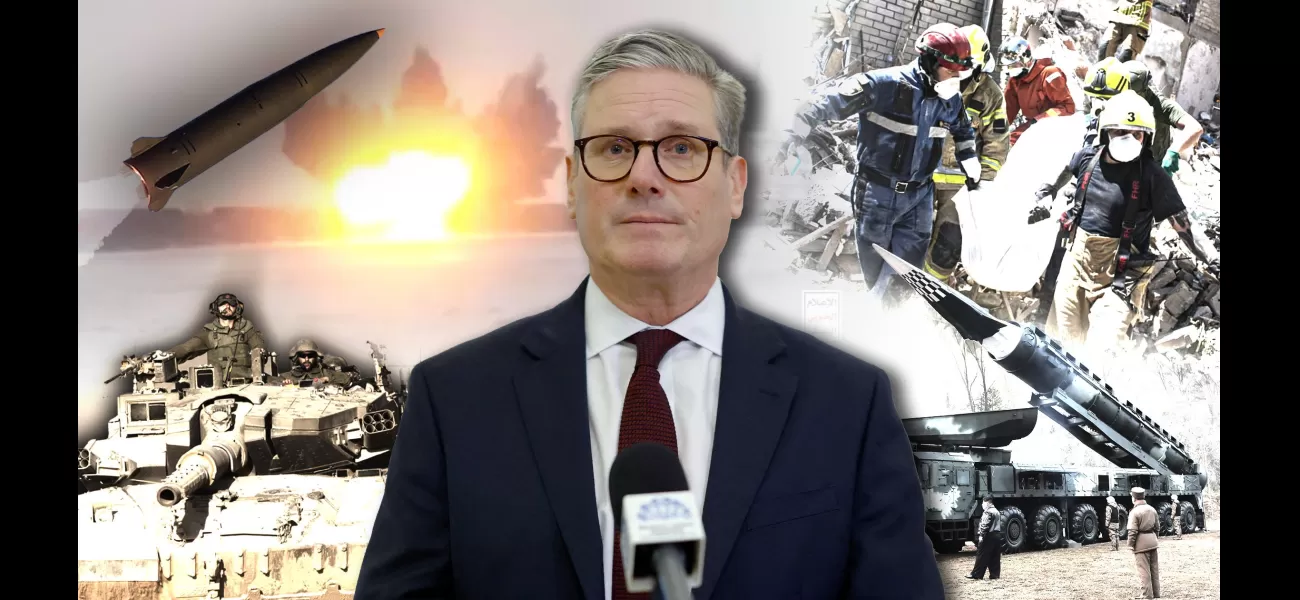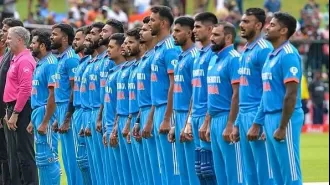UK must increase military strength to prevent World War III in next five years due to emerging threat from new alliance.
Biggest threats: Russia, China, Iran, and North Korea are top concerns.
July 9th 2024.

The new Labour government has made a promise to invest 2.5% of the country's GDP into the military, but only when the economy is in a better state. This comes at a crucial time as the outgoing head of the British army, General Sir Patrick Sanders, has issued a warning about the possibility of a global conflict similar to World War Three within the next five years. He believes that if Nato does not take action and wake up from its military slumber, Western powers will fall into a trap set by Russian President Vladimir Putin.
In an interview with The Times, General Sanders expressed his concern about the rising threat from Russia, Iran, and China, labeling them as the "new Axis powers." He emphasized that these countries pose an even greater danger than Nazi Germany. He pointed out that according to estimates, Russia will have the capability to pose a significant threat within the next five to ten years, and Putin may take advantage of this by initiating operations that are just below the level of conflict or even seizing territory opportunistically.
General Sanders believes that the key to preventing such a conflict is by taking the right steps now. This includes addressing any threats and gaps in the military's capabilities, modernizing the armed forces, and making society and the UK more resilient. However, he also warned that the British military is not currently strong enough to undertake a conflict like the 2003 invasion of Iraq.
This warning from General Sanders comes at a crucial time as Sir Keir Starmer, leader of the Labour Party, is set to depart for Washington to attend the 75th anniversary of the Trans-Atlantic alliance. In their manifesto, the Labour Party has pledged to spend 2.5% of GDP on the military, but only when the economy is in a better state. Military sciences director at RUSI, Matthew Savill, has urged the new government to make decisions sooner rather than later in order to avoid becoming "hollow."
Like General Sanders, Mr. Savill also sees a growing threat from state actors such as Russia and China, as well as non-state groups like Yemen's Houthi movement. He believes that in terms of firepower and destructive force, numbers do matter. However, the trend in recent years has been to prioritize sophistication over numbers, leading to a decrease in overall firepower. Mr. Savill also noted that the UK does have some strengths, but they are not at an impressive scale when facing an adversary with significant military power and willingness to suffer losses.
For example, the UK's most advanced tank, the Challenger 3, will only be available in limited numbers, and it will have to perform "heroically" against the ground forces of a country like Russia. RUSI experts have estimated that for the army to deploy a single armoured brigade, they would need to commit around 70 to 80% of their total combat engineering capabilities. Mr. Savill believes that the idea of the UK having enough resources to deploy a full division is unrealistic. In conclusion, both General Sanders and Mr. Savill stress the importance of taking action now to prevent a global conflict in the coming years.
In an interview with The Times, General Sanders expressed his concern about the rising threat from Russia, Iran, and China, labeling them as the "new Axis powers." He emphasized that these countries pose an even greater danger than Nazi Germany. He pointed out that according to estimates, Russia will have the capability to pose a significant threat within the next five to ten years, and Putin may take advantage of this by initiating operations that are just below the level of conflict or even seizing territory opportunistically.
General Sanders believes that the key to preventing such a conflict is by taking the right steps now. This includes addressing any threats and gaps in the military's capabilities, modernizing the armed forces, and making society and the UK more resilient. However, he also warned that the British military is not currently strong enough to undertake a conflict like the 2003 invasion of Iraq.
This warning from General Sanders comes at a crucial time as Sir Keir Starmer, leader of the Labour Party, is set to depart for Washington to attend the 75th anniversary of the Trans-Atlantic alliance. In their manifesto, the Labour Party has pledged to spend 2.5% of GDP on the military, but only when the economy is in a better state. Military sciences director at RUSI, Matthew Savill, has urged the new government to make decisions sooner rather than later in order to avoid becoming "hollow."
Like General Sanders, Mr. Savill also sees a growing threat from state actors such as Russia and China, as well as non-state groups like Yemen's Houthi movement. He believes that in terms of firepower and destructive force, numbers do matter. However, the trend in recent years has been to prioritize sophistication over numbers, leading to a decrease in overall firepower. Mr. Savill also noted that the UK does have some strengths, but they are not at an impressive scale when facing an adversary with significant military power and willingness to suffer losses.
For example, the UK's most advanced tank, the Challenger 3, will only be available in limited numbers, and it will have to perform "heroically" against the ground forces of a country like Russia. RUSI experts have estimated that for the army to deploy a single armoured brigade, they would need to commit around 70 to 80% of their total combat engineering capabilities. Mr. Savill believes that the idea of the UK having enough resources to deploy a full division is unrealistic. In conclusion, both General Sanders and Mr. Savill stress the importance of taking action now to prevent a global conflict in the coming years.
[This article has been trending online recently and has been generated with AI. Your feed is customized.]
[Generative AI is experimental.]
0
0
Submit Comment





